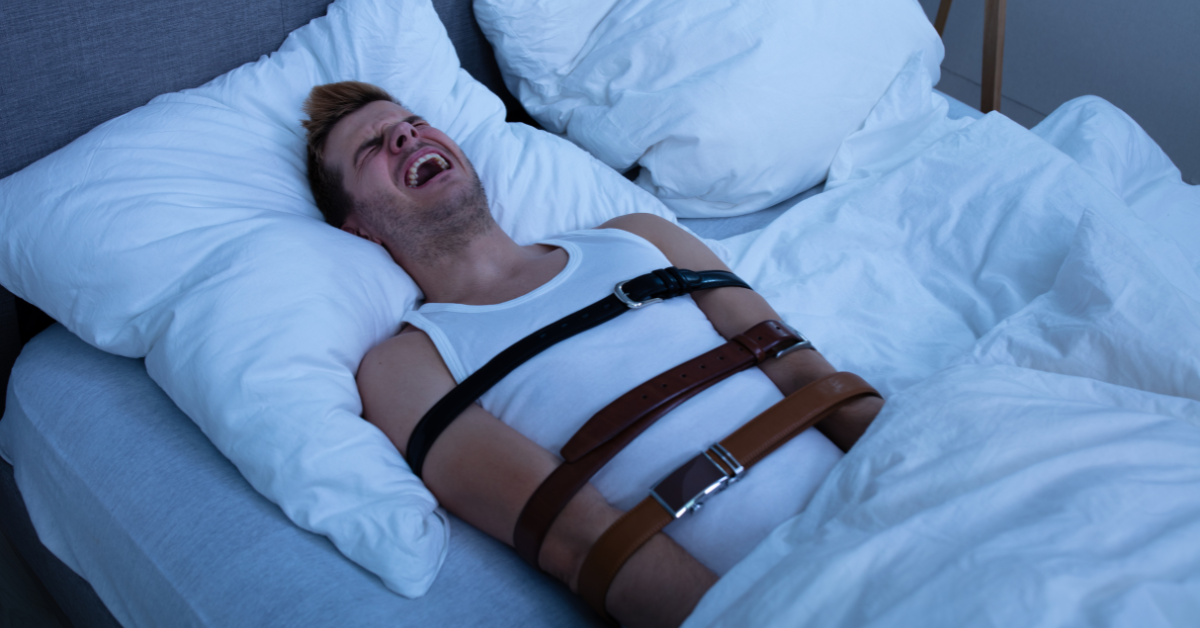Sleep paralysis is a frightening and often misunderstood phenomenon. It causes sufferers to wake up from sleep feeling paralyzed and unable to move, accompanied by often overwhelming feelings of fear. Even though this sleep disorder can occur suddenly and without warning, it is relatively common, affecting around 7 percent of the population. So, what are the causes of sleep paralysis?
In this article, we will explore the potential triggers for sleep paralysis—from environmental factors to psychological issues—and discuss how you can help manage your symptoms.
What is Sleep Paralysis?
Sleep paralysis occurs when people are unable to move or speak while falling asleep or waking up. It can be a frightening experience, as the person may feel like they are trapped in their body and unable to move.
In most cases, sleep paralysis is temporary and harmless. However, it can be a sign of an underlying health condition, such as narcolepsy or sleep apnea.
Sleep paralysis typically lasts for a few seconds to a few minutes, and generally resolves on its own. In some cases, sleep paralysis may be associated with sleep disorders such as narcolepsy.
Treatment options for sleep paralysis may include lifestyle changes, such as sleeping on your side or avoiding caffeine late in the day.
Certain medications and cognitive behavioral therapy (CBT) are the options to treat underlying conditions that may contribute to sleep paralysis.
It is important to speak with a doctor if you experience recurrent episodes of sleep paralysis, as this may be a sign of an underlying disorder.
The Different Types of Sleep Paralysis
There are different types of sleep paralysis, and the causes can vary.
One type is isolated sleep paralysis, which is when a person has one or two episodes of sleep paralysis in their lifetime. The cause of isolated sleep paralysis is unknown, but it’s thought to be linked to stress or fatigue.
Another type is “recurrent isolated sleep paralysis” when a person is having multiple episodes of sleep paralysis over their lifetime.
In chronic or recurrent isolated sleep paralysis, a person has frequent episodes of sleep paralysis, and the episodes last for weeks or months. Sleep deprivation or another underlying medical condition can cause this type of sleep paralysis.
A third type of sleep paralysis is called dysphoric or nightmare-related sleep paralysis. This type is classified by intense fear, terror, and panic during the episode. It is often associated with nightmares or flashbacks to traumatic experiences
Finally, another type of sleep paralysis is secondary sleep paralysis. This occurs when a person has an underlying medical condition that disrupts their sleep cycles. Conditions such as narcolepsy, sleep apnea, and restless leg syndrome can all cause secondary sleep paralysis.
No matter the type of sleep paralysis, it is important to seek help from a medical professional to find the right treatment plan.
Causes of Sleep Paralysis
There are several possible causes of sleep paralysis. One is simply being sleep deprived or exhausted. This can happen if you’ve been working long hours, or if you have insomnia or another sleep disorder.
Another potential cause changes in your sleep schedule. If you regularly change time zones or work irregular hours, this can disrupt your natural sleep patterns and lead to sleep paralysis.
Certain medications can also cause sleep paralysis as a side effect. These include antidepressants, antihistamines, and some blood pressure medications.
Finally, stress or anxiety may cause sleep paralysis. This is especially likely if you have experienced a traumatic event or have post-traumatic stress disorder (PTSD).
Sleep paralysis may be a sign of an underlying medical condition, so consult your doctor if you experience it.
Symptoms of Sleep Paralysis
There are a few tell-tale signs that you may be experiencing sleep paralysis. Firstly, you may find it difficult to move your body or speak while falling asleep or upon waking up.
You may also experience hallucinations during this time, feeling as though someone is in the room with you or even sitting on your chest.
These episodes can last anywhere from a few seconds to a few minutes and may leave you feeling frightened or panicked.
In some cases, people have reported feeling intense pressure on their chest as well, making it hard to breathe.
If you believe you are experiencing sleep paralysis, it is best to consult with a sleep specialist to rule out any other underlying conditions.
How to Treat Sleep Paralysis?
Most people who experience sleep paralysis don’t need treatment. If sleep paralysis is bothering you, you can take some simple steps to reduce your risk of experiencing it.
To reduce your risk of sleep paralysis:
- Get enough sleep: Most people need around eight hours of sleep a day. You should try to stick to a regular sleep schedule, which includes going to bed and waking up at roughly the same times each day.
- Reduce stress: Stress can contribute to sleep problems. Try relaxation techniques such as yoga or meditation.
- Avoid alcohol and drugs: Both alcohol and recreational drugs can disrupt your sleep patterns and increase your risk of sleep paralysis.
- See a doctor: If your sleep paralysis is severe or interferes with your daily life, you should talk to a doctor. They may be able to diagnose and treat any underlying medical condition that’s contributing to the problem.
If you experience sleep paralysis, remember it’s a common and generally harmless condition. It’s also important to recognize that it doesn’t indicate that you have a mental health problem.
Conclusion
Sleep paralysis can be a frightening experience, but it is important to remember that it is not dangerous.
While further research needs to be done on the causes of sleep paralysis and how best to manage them, taking steps like getting better sleep hygiene and managing stress can help reduce your chances of experiencing an episode.
By understanding what triggers may cause your episodes and developing coping strategies, you can better navigate through sleeping paralysis events when they do happen.
